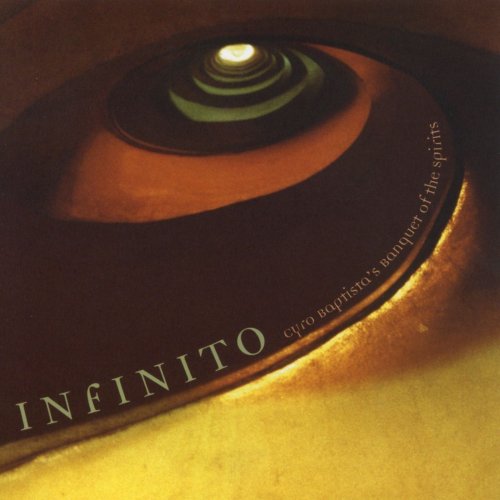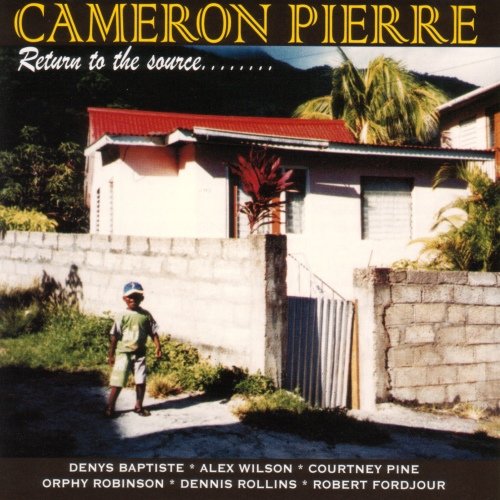Cyro Baptista's Banquet Of The Spirits - Infinito (2009)

Artist: Cyro Baptista's Banquet Of The Spirits
Title: Infinito
Year Of Release: 2009
Label: Tzadik
Genre: Latin Jazz, World Fusion
Quality: flac lossless (tracks)
Total Time: 00:47:
WebSite: Album Preview
TracklistTitle: Infinito
Year Of Release: 2009
Label: Tzadik
Genre: Latin Jazz, World Fusion
Quality: flac lossless (tracks)
Total Time: 00:47:
WebSite: Album Preview
01. Infinito coming
02. Batida De Coco
03. In Vitrous
04. Kwanza
05. Noia
06. Adeus as Filhas
07. Coronation Of A Slave Queen
08. Cantor Cuidadoso
09. Pro Flavio
10. Blindman
11. Infinito going
While the wraparound spine-sleeve descriptor sheet that accompanies on Cyro Baptista's fourth Tzadik album Infinito claims that these are "experimental Brazilian pop songs," those who have come to love his work on his previous three albums for the label shouldn't be worried. The notes that accompany the label's offerings have been known to contain hyperbole and (very occasionally) misleading information. For starters, Baptista is backed here with his current band, Banquet of the Spirits on a good chunk of the set, and is augmented by other players. These include Anat Cohen, Erik Friedlander, Peter Scherer, Romero Lubambo and at least a dozen others. The second thing to remember is that Baptista cannot be reined in by any classification. He is simply one of the most limitless musicians we have -- as evidenced by a list of the people he has played behind as a sideman, from Yo Yo Ma and Laurie Anderson, Herbie Hancock, Trey Anastasio, and Paul Simon, to even crusty, musty musical conservatives like Wynton Marsalis and Sting.
There are vocals on several cuts here, most notably the title track opener (which is reprised at the very end sans voices), "Batida de Côco," (composed with Hermeto Pascoal and Teese Gohl), the gorgeous "Adeus Às Filhas," and the charging "Cantor Cuidadoso." None of these tunes could actually be called "pop" songs in any recognizable sense of the word. These are wild adventures that meld numerous Brazilian forms from maracatu and samba to choro, and sertanejo to brega, as well as música gaúcha and frevo. In addition, various Afro-Cuban musical traditions, including son and charanga, as well as several other Latin and African musics, jazz, and funk are encompassed. Numerous musics exist within a single composition. In other words, this is Baptista's expansive vision of music and he has the chops -- as a composer, multi-instrumentalist, bandleader and arranger -- to pull it all off and make it sound easy. Period. Check "Kwanza," one of two cuts graced by Cohen's soprano saxophone. A funky guitar riff rides atop congas, claps, melodica, and keyboards until she and several other drums enter the picture. The rhythmic pulses are ever shifting even as the various sections all inform that main statement and melody. Half way through, Cohen and Brian Marsella's melodica play a Sephardic Jewish folk melody via a harmonic statement that resembles Frank Zappa's early-'70s work, and the dynamics are utterly transformed before something else again emerges eventually to take the tune out. This is indicative of the music that appears on Infinito. Lubambo's "Pro Flàvio" features only his acoustic guitars and Baptista on an array of percussion instruments and resembles a dead cross between flamenco and samba, yet contains the melody and counterpoint of Manuel del Falla's influence. Despite the kaleidoscopic ambition of Infinito, and its sometimes frenetic pace, the album is quite accessible, and a pleasure to listen to and indulge in. If only most popular music, Brazilian or otherwise, were this colorful and exciting. This is another winner in a catalog full of them.


![Julius van Rhee - Hidden Places (2024) [Hi-Res] Julius van Rhee - Hidden Places (2024) [Hi-Res]](https://www.dibpic.com/uploads/posts/2024-06/1718199842_e2p8gqu439j9a_600.jpg)
![The HI-FI Collective - The Big Chill (2024) [Hi-Res] The HI-FI Collective - The Big Chill (2024) [Hi-Res]](https://www.dibpic.com/uploads/posts/2024-06/1718503286_cover.jpg)
![Sleazy Grease - ...Thanks, Appreciate it (2024) [Hi-Res] Sleazy Grease - ...Thanks, Appreciate it (2024) [Hi-Res]](https://www.dibpic.com/uploads/posts/2024-06/1718433086_iobeyj7zu7zea_600.jpg)
![Lil' John Roberts - Elevation (2024) [Hi-Res] Lil' John Roberts - Elevation (2024) [Hi-Res]](https://www.dibpic.com/uploads/posts/2024-06/1718304022_neqi5z5x4ydvb_600.jpg)
![Julius Rodriguez - Evergreen (2024) [Hi-Res] Julius Rodriguez - Evergreen (2024) [Hi-Res]](https://www.dibpic.com/uploads/posts/2024-06/1718257550_sr14nl4alhpjb_600.jpg)

